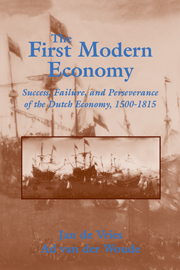Book contents
- Frontmatter
- Contents
- List of tables, figures, and maps
- Preface
- The First Modern Economy
- 1 By way of introduction
- STRUCTURES
- SECTORS
- ANALYSIS
- 11 City and country: the social structure of a modern economy
- 12 The standard of living and the labor market
- 13 The course of the economy: a macroeconomic analysis
- 14 Postlude
- Bibliography
- Index
11 - City and country: the social structure of a modern economy
Published online by Cambridge University Press: 26 October 2011
- Frontmatter
- Contents
- List of tables, figures, and maps
- Preface
- The First Modern Economy
- 1 By way of introduction
- STRUCTURES
- SECTORS
- ANALYSIS
- 11 City and country: the social structure of a modern economy
- 12 The standard of living and the labor market
- 13 The course of the economy: a macroeconomic analysis
- 14 Postlude
- Bibliography
- Index
Summary
City and country in symbiosis
The preceding chapters have emphasized over and again that Dutch society from the sixteenth century was dominated by its cities. During the sixteenth century, the nobles, and rural society more generally, could still nurture the illusion that they formed a counterweight of significance. But from the final decades of that century, the cities were in fact fully dominant: economically, politically, culturally. The power and influence of the cities in the province of Holland was, of course, proverbial. But in many other provinces, the cities also dominated, as is clear from both the high urbanization rates of these provinces and the constitutional provisions for their influence. Two developments conspired to strengthen the political position of the cities in most provinces in the period that bridges the medieval and early modern eras. The triumph of the Reformation eliminated the clergy as an autonomous center of political power, leaving only the burgers (i.e., the cities) and the nobles to occupy the offices of state. Of these two surviving orders, the nobility had been severely weakened, and in many cases impoverished, by the extended social and internal political conflicts that had filled most of the fifteenth century. The Reformation only exacerbated the problems of this beleaguered order, since it forced its members once again to declare their allegiance, now pro or contra Philip II and the Catholic Church. Many nobles found it impossible, whether for social or spiritual reasons, to renounce their allegiance to the old order and were automatically excluded from the political system when the new Republican order triumphed.
- Type
- Chapter
- Information
- The First Modern EconomySuccess, Failure, and Perseverance of the Dutch Economy, 1500–1815, pp. 507 - 606Publisher: Cambridge University PressPrint publication year: 1997

